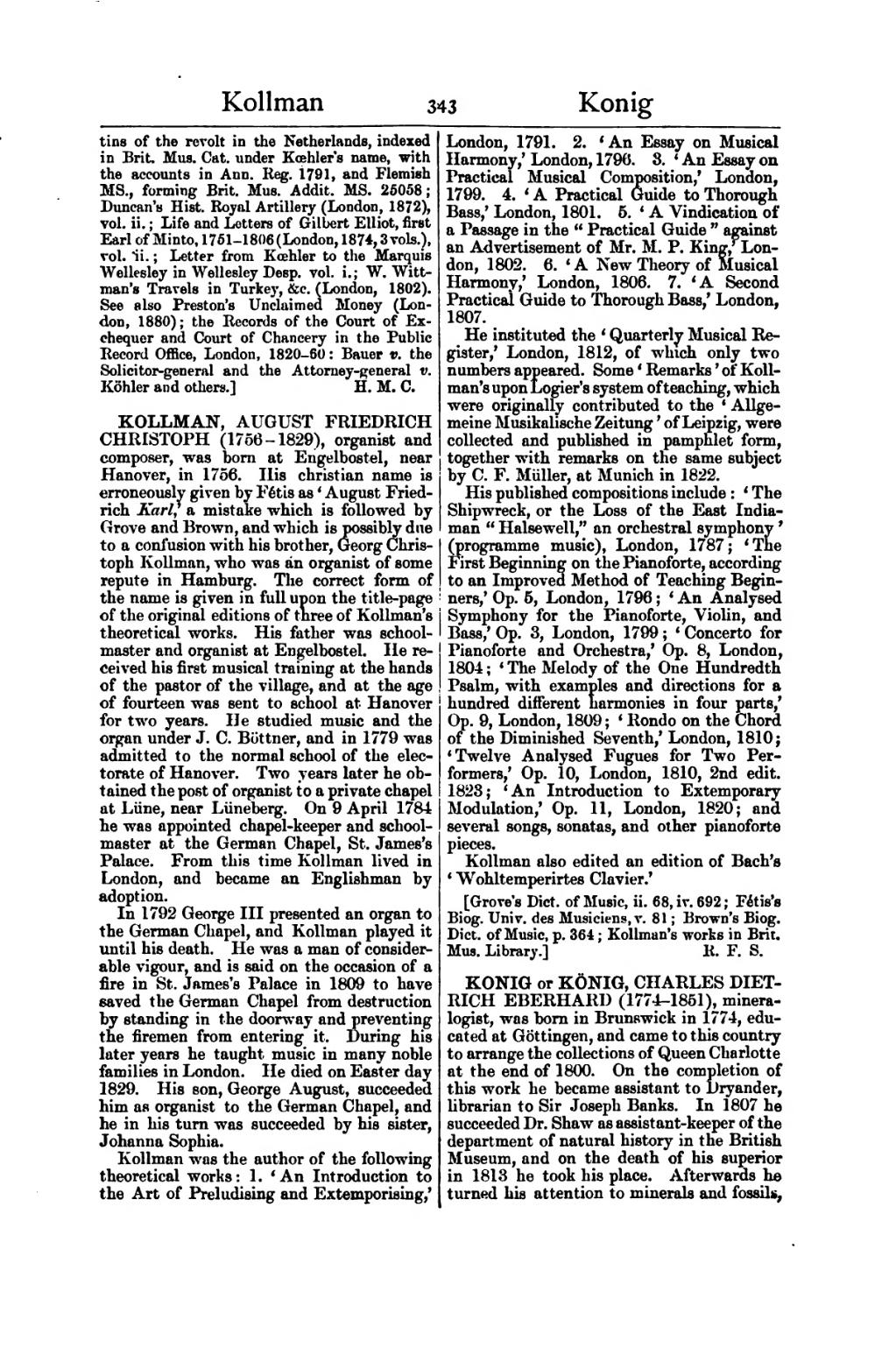KOLLMAN, AUGUST FRIEDRICH CHRISTOPH (1756–1829), organist and composer, was born at Engelbostel, near Hanover, in 1756. His christian name is erroneously given by Fétis as ‘August Friedrich Karl,’ a mistake which is followed by Grove and Brown, and which is possibly due to a confusion with his brother, Georg Christoph Kollman, who was an organist of some repute in Hamburg. The correct form of the name is given in full upon the title-page of the original editions of three of Kollman's theoretical works. His father was schoolmaster and organist at Engelbostel. He received his first musical training at the hands of the pastor of the village, and at the age of fourteen was sent to school at Hanover for two years. He studied music and the organ under J. C. Böttner, and in 1779 was admitted to the normal school of the electorate of Hanover. Two years later he obtained the post of organist to a private chapel at Lüne, near Lüneberg. On 9 April 1784 he was appointed chapel-keeper and schoolmaster at the German Chapel, St. James's Palace. From this time Kollman lived in London, and became an Englishman by adoption.
In 1792 George III presented an organ to the German Chapel, and Kollman played it until his death. He was a man of considerable vigour, and is said on the occasion of a fire in St. James's Palace in 1809 to have saved the German Chapel from destruction by standing in the doorway and preventing the firemen from entering it. During his later years he taught music in many noble families in London. He died on Easter day 1829. His son, George August, succeeded him as organist to the German Chapel, and he in his turn was succeeded by his sister, Johanna Sophia.
Kollman was the author of the following theoretical works: 1. ‘An Introduction to the Art of Preludising and Extemporising,’ London, 1791. 2. ‘An Essay on Musical Harmony,’ London, 1796. 3. ‘An Essay on Practical Musical Composition,’ London, 1799. 4. ‘A Practical Guide to Thorough Bass,’ London, 1801. 5. ‘A Vindication of a Passage in the “Practical Guide” against an Advertisement of Mr. M. P. King,’ London, 1802. 6. ‘A New Theory of Musical Harmony,’ London, 1806. 7. ‘A Second Practical Guide to Thorough Bass,’ London, 1807.
He instituted the ‘Quarterly Musical Register,’ London, 1812, of which only two numbers appeared. Some ‘Remarks’ of Kollman's upon Logier's system of teaching, which were originally contributed to the ‘Allgemeine Musikalische Zeitung’ of Leipzig, were collected and published in pamphlet form, together with remarks on the same subject by C. F. Müller, at Munich in 1822.
His published compositions include: ‘The Shipwreck, or the Loss of the East Indiaman “Halsewell,” an orchestral symphony’ (programme music), London, 1787; ‘The First Beginning on the Pianoforte, according to an Improved Method of Teaching Beginners,’ Op. 5, London, 1796; ‘An Analysed Symphony for the Pianoforte, Violin, and Bass,’ Op. 3, London, 1799; ‘Concerto for Pianoforte and Orchestra,’ Op. 8, London, 1804; ‘The Melody of the One Hundredth Psalm, with examples and directions for a hundred different harmonies in four parts,’ Op. 9, London, 1809; ‘Rondo on the Chord of the Diminished Seventh,’ London, 1810; ‘Twelve Analysed Fugues for Two Performers,’ Op. 10, London, 1810, 2nd edit. 1823; ‘An Introduction to Extemporary Modulation,’ Op. 11, London, 1820; and several songs, sonatas, and other pianoforte pieces.
Kollman also edited an edition of Bach's ‘Wohltemperirtes Clavier.’
[Grove's Dict. of Music, ii. 68, iv. 692; Fétis's Biog. Univ. des Musiciens, v. 81; Brown's Biog. Dict. of Music, p. 364; Kollman's works in Brit. Mus. Library.]
KONIG or KÖNIG, CHARLES DIETRICH EBERHARD (1774–1851), mineralogist, was born in Brunswick in 1774, educated at Göttingen, and came to this country to arrange the collections of Queen Charlotte at the end of 1800. On the completion of this work he became assistant to Dryander, librarian to Sir Joseph Banks. In 1807 he succeeded Dr. Shaw as assistant-keeper of the department of natural history in the British Museum, and on the death of his superior in 1813 he took his place. Afterwards he turned his attention to minerals and fossils,
